US opens doors wider for Vietnamese farm produce

The US has opened the doors for more Vietnamese agricultural exports with the establishment of an inspection office right in the country.
The US Embassy in Hanoi recently opened the new office of the US Department of Agriculture’s (USDA) Animal and Plant Health Inspection Service (APHIS) in the capital.
With this office, which is considered an important step toward boosting US-Vietnamese agricultural co-operation, Vietnamese exporters and authorised US agencies will be able to save lots of time and costs when conducting sanitary and phytosanitary (SPS) inspections to protect against potential plant pest risks from Vietnamese agricultural products exported to the US.
In the past, in order to export fruit to the US, the produce first had to undergo an SPS examination in the US.
“The APHIS Hanoi office maintains technical working relations with its Vietnamese counterparts to resolve SPS issues whenever they arise,” said the embassy’s statement on the establishment of the office. “The regulatory mission of APHIS allows for a flow of agricultural trade that meets international animal and plant health standards. This aspect of APHIS’ mission has helped Vietnam export several varieties of fruit, including star-apples, which are now available to the American public.”
After analysing the potential plant pest risks, APHIS scientists will determine under whether imported products, including those from Vietnam, can be safely imported under a systems approach. The systems approach is a raft of solutions taken by growers, packers, and shippers that, in combination, minimises pest risks before importation into the US. The systems approach for Vietnamese products includes orchard or packing house requirements, irradiation treatment, and port of entry inspection, to protect against the introduction of plant pests and diseases.
Two months ago, the first Vietnamese star-apples began to be exported to the US, after months of examination by APHIS in the US. Vietnam is the first nation to get permission from the US to export this type of fruit to its market.
Recently, APHIS also allowed for the importation of mango from Vietnam, effective from December 29, 2017.
A rise in fruit exports to the US is very important to Vietnam’s global agricultural product image and will benefit hundreds of thousands of farmers.
With this, Vietnam was able to raise the number of fruits exported to the US to six, in addition to the existing dragon fruit, rambutan, lychee, longan, and star-apples.
Vietnam has also registered more than 10 additional types of fruit at APHIS for exporting to the US.
According to an expert from the Department of Crop Production under the Vietnamese Ministry of Agriculture and Rural Development, a rise in fruit exports to the US is very important to Vietnam’s global agricultural product image and will benefit hundreds of thousands of farmers.
“It will make it much easier for Vietnam to boost its agricultural products worldwide, because if we meet strict requirements from the US, we can meet requirements from many other foreign markets,” the expert said.
APHIS is a multifaceted agency with a broad mission area that includes protecting and promoting US agricultural health, regulating genetically-engineered organisms, administering the Animal Welfare Act, and carrying out wildlife damage management activities. These efforts support the overall mission of USDA, which is to protect and promote food, agriculture, and natural resources.
Có thể bạn quan tâm
 Bio-refineries could reduce imports of environmentally harmful soy
Bio-refineries could reduce imports of environmentally harmful soy Farming in Europe is one of the primary causes of the ongoing deforestation in South America as rainforests are cleared to make way for large soy bean plantatio
 Coffee to be restructured for higher quality production
Coffee to be restructured for higher quality production Vietnam will narrow down its coffee plantation areas and focus more on improving coffee product structure in a bid to create high-quality beans with higher
 Delta jackfruit farmers earn big profits
Delta jackfruit farmers earn big profits Farmers in the Cửu Long (Mekong) Delta growing Thai jackfruit are earning big profits from exports because of the high demand for the fruit in overseas markets.